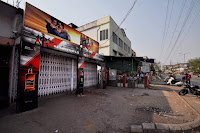Liquor ban : Focus needs to shift to stricter road vigils and drunk driving, not liquor ban
Liquor ban: Is it not a disregard and break-in in court orders?
Before giving its judgment, the Supreme Court has perhaps not considered the reasons behind deaths in road accidents which is said to be main aim to ban the sale of liquor on the national and state highways.
A total ban was put on the sale of liquor by the Supreme Court in its recent judgment, within 500 metres of nation and state highways throughout the country terming it that drunk driving was one of the major causes of road accidents in the country.
In fact, the Punjab government has found a way to reduce the effect of the Supreme Court’s orders banning sale or serving of liquor within 500 metres of national and state highways. The state government denotified 12 such highway stretches that pass through cities and towns but for which bypasses were already built.
Due to the ban, the state had apprehended a loss of Rs 1,300 as revenue this fiscal for the excise and taxation department that governs liquor sale. And the denotification of the bypassed stretches would offer some respite, though that would be quantified only later.
The seven state highway stretches denotified by the public works department are in the districts SAS Nagar, Pathankot, Moga, Hoshiarpur, Patiala, Fatehgarh Sahib, and Nawanshahr.
However, the notification says, “The government over the years constructed a number of bypasses on state highways to decongest select cities. As a consequence, the bypassed parts of these highways passing through the cities are no more required to be state highways.”
However, a look at A loo at the 2015 report on road accidents by the Ministry of Road Transport and Highways (MoRTH), however, suggests otherwise. The share of accidents caused due to the consumption of alcohol/drugs constitutes a small percentage – 3.3% – of all road accidents (16,298 out of 5,01,423 accidents) and 4.6% of fatalities (6,755 out of 1,46,133 deaths). This means that over 96% of road accidents were caused not by drunk drivers but by sober people.
In the eyes of Supreme Court it might be acting in public interest, as a guardian of people’s right but its powers are free-for-all. Such outright overreach can prove problematic for the entire system of governance in the country so far as generation of excise revenues and large scale unemployed. It looks that these concerns were considered secondary to public health and safety.
Non-drinkers say that why the action at the root level to close down the breweries are taken and generate the revenues by setting up other production houses.
At the same time, the decision of the Punjab Government to allow the sale of liquor on the national highways looks to be a burglary in the orders of the Supreme Court.
Added here, recently the Punjab Cabinet has recently approved the amendment in the Punjab Excise Amendment Bill 2017 – changing the definition of ‘sale of liquor’ – allowing the sale of liquor at the hotels, restaurant and clubs, within 500 kms of national highways. It looks to be a backdoor entry to counter the court’s judgment by interpreting that the ban was on the shops and not on the hotels, restaurants and clubs. It is not understood as to whether this will be digestible to the court or not but the motive behind the amendment in rules is clear as the sale of liquor is one of the major source of income of the state. It could be measured from the fact that around Rs.2600 crore revenue has been generated by the government in the recent auction.
It’s not the Punjab state only who is facing problem on the orders of Apex Court it is for all the states. In certain states, there is a practical problem like Himachal Pradesh where the orders of the court cannot be implemented practically being hilly areas to open the liquor vends at a distance of 500 metres. Rather, the shops could only be closed. In the petition, a reference of road accidents was indicated for banning the sale of liquor on the national highways.
India is number one so far as road accidents are concerned. In 2015, on an average, about 400 people die every day in road accidents and it is on the increasing trend. Some are seriously injured and some become permanently handicap in the accidents. The reasons behind the road accidents are high speed driving, violation of traffic rules while overtaking, availability of big patches on the highways, non-availability of lights on the roads at certain appropriate places and there are number of other problems. Driving after drinking is one of the major reasons and this tendency is increasing.
Let me also share that ArriveSafe – a leading NGO based at Chandigarh was one of the petitioners in the case and with the recent government orders is not impressed. Harman Sidhu after thorough study of the bill, will decide future course of action and movement to the court for amendment soon.
Frankly speaking, the burglary in the court orders and interpretation suitable to the states for not implementing looks to be a disregard to the court orders.
What to be seen from the available statistics is that the focus needs to shift to stricter road vigils and drunk driving and not liquor ban. At the same time, imagine what rules and regulations of this kind could do to a country like India where road rage, bribery and blatant disregard for traffic rules are the norm.
No doubt some argue that bribery will not go away, no matter what is done but in that case we need to switch over to new technology in this high-tech era, to bypass the police department altogether in these efforts. The automated road camera system on the national highways can be easily deployed on our roads and fine appears directly in the offender’s phone or email without the need for any police intervention.
On the suggestive side, instead of crushing businesses and industries that rely heavily on the availability of alcohol, the need of the hour is the focus needs to curb he misuse seen on our roads and to shift to stricter road vigils and drunk driving, not liquor ban.
Only the ‘will’ is required as the popular saying goes, ‘where there is will, there is a way’ as the law enforcement with vigilance and accountability is only the answer to any problem.




